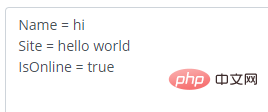How to initialize multiple variables in go language
Methods for initializing multiple variables: 1. Use the var keyword to define and initialize multiple variables at one time, the syntax "var(variable 1 = expression 1 variable 2 = expression 2 variable 3 = expression Formula 3)"; 2. Use the colon equal to ":=" to define and initialize multiple variables at one time, the syntax is "variable 1, variable 2, variable 3, ... := expression 1, expression 2, expression Formula 3,...".

The operating environment of this tutorial: Windows 7 system, GO version 1.18, Dell G3 computer.
Go language variables can support defining and initializing multiple variables at the same time when defining them. Go language supports the use of var syntax or := syntax when declaring and initializing multiple variables.
Method 1: Use var statement for multi-variable initialization
We can use the var keyword to define and initialize multiple variables at once .
Syntax:
var(
变量1 = 表达式1
变量2 = 表达式2
变量3 = 表达式3
)Example: Use the form of var() to define and initialize multiple variables at the same time
package main
import "fmt"
func main() {
var(
name = "hello"
site = "world"
isOnline = true
)
fmt.Println("Name =", name, ",Site =", site, ",IsOnline =", isOnline)
}
Method 2: Use a colon equal to "<span style="font-size: 18px;">:=</span>" for multi-variable initialization
We can use the form := to define and initialize multiple variables at one time.
Syntax:
变量1, 变量2, 变量3, ... := 表达式1, 表达式2, 表达式3, ...
Example: Use the form := to define and initialize multiple variables at the same time
package main
import "fmt"
func main() {
name, site, isOnline := "hi", "hello world", true
fmt.Println("Name =", name, "\nSite =", site, "\nIsOnline =", isOnline)
}
【Related recommendations: Go video tutorial, Programming teaching】
The above is the detailed content of How to initialize multiple variables in go language. For more information, please follow other related articles on the PHP Chinese website!

Hot AI Tools

Undresser.AI Undress
AI-powered app for creating realistic nude photos

AI Clothes Remover
Online AI tool for removing clothes from photos.

Undress AI Tool
Undress images for free

Clothoff.io
AI clothes remover

AI Hentai Generator
Generate AI Hentai for free.

Hot Article

Hot Tools

Notepad++7.3.1
Easy-to-use and free code editor

SublimeText3 Chinese version
Chinese version, very easy to use

Zend Studio 13.0.1
Powerful PHP integrated development environment

Dreamweaver CS6
Visual web development tools

SublimeText3 Mac version
God-level code editing software (SublimeText3)

Hot Topics
 Which libraries in Go are developed by large companies or provided by well-known open source projects?
Apr 02, 2025 pm 04:12 PM
Which libraries in Go are developed by large companies or provided by well-known open source projects?
Apr 02, 2025 pm 04:12 PM
Which libraries in Go are developed by large companies or well-known open source projects? When programming in Go, developers often encounter some common needs, ...
 What is the problem with Queue thread in Go's crawler Colly?
Apr 02, 2025 pm 02:09 PM
What is the problem with Queue thread in Go's crawler Colly?
Apr 02, 2025 pm 02:09 PM
Queue threading problem in Go crawler Colly explores the problem of using the Colly crawler library in Go language, developers often encounter problems with threads and request queues. �...
 In Go, why does printing strings with Println and string() functions have different effects?
Apr 02, 2025 pm 02:03 PM
In Go, why does printing strings with Println and string() functions have different effects?
Apr 02, 2025 pm 02:03 PM
The difference between string printing in Go language: The difference in the effect of using Println and string() functions is in Go...
 What libraries are used for floating point number operations in Go?
Apr 02, 2025 pm 02:06 PM
What libraries are used for floating point number operations in Go?
Apr 02, 2025 pm 02:06 PM
The library used for floating-point number operation in Go language introduces how to ensure the accuracy is...
 How to ensure concurrency is safe and efficient when writing multi-process logs?
Apr 02, 2025 pm 03:51 PM
How to ensure concurrency is safe and efficient when writing multi-process logs?
Apr 02, 2025 pm 03:51 PM
Efficiently handle concurrency security issues in multi-process log writing. Multiple processes write the same log file at the same time. How to ensure concurrency is safe and efficient? This is a...
 How to solve the problem that custom structure labels in Goland do not take effect?
Apr 02, 2025 pm 12:51 PM
How to solve the problem that custom structure labels in Goland do not take effect?
Apr 02, 2025 pm 12:51 PM
Regarding the problem of custom structure tags in Goland When using Goland for Go language development, you often encounter some configuration problems. One of them is...
 How to use Golang to implement Caddy-like background running, stop and reload functions?
Apr 02, 2025 pm 02:12 PM
How to use Golang to implement Caddy-like background running, stop and reload functions?
Apr 02, 2025 pm 02:12 PM
How to implement background running, stopping and reloading functions in Golang? During the programming process, we often need to implement background operation and stop...
 How to solve the problem of Golang generic function type constraints being automatically deleted in VSCode?
Apr 02, 2025 pm 02:15 PM
How to solve the problem of Golang generic function type constraints being automatically deleted in VSCode?
Apr 02, 2025 pm 02:15 PM
Automatic deletion of Golang generic function type constraints in VSCode Users may encounter a strange problem when writing Golang code using VSCode. when...






